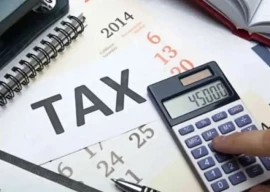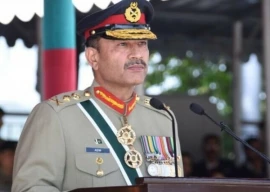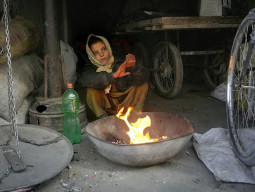Addressing the 'Policy Symposium on Pakistan Economy & IMF Programme: Challenges & Opportunities', Zaidi termed taxes the only way forward for an equitable distribution of wealth and the establishment of an equitable society in the country.
"I meet 14-15 delegations every day and everyone says the same thing: 'please stop charging all these taxes'," he said. "We must realise that simply giving Zakat, charity and donations is not enough… everyone is equally liable to pay taxes."
He wondered over the opposition to the condition of producing national identity card for the purchase of over Rs50,000. "What is the problem in showing your identity card?" he asked. "Everybody wants identity card condition gone but we cannot accept this demand," he said.
According to the FBR chief there were around 100,000 companies registered with the government, but only 60,000 file their returns. He said some big companies earned profits up to 25% but "the tragedy is that the tax is not collected on actual income".
However, he said, the measures taken in the federal budget will fundamentally change this scenario. "We are changing the whole tax system in the budget. We will collect taxes on incomes, rather than items," he said. "We cannot have equitable society unless we have a fair taxation system."
He admitted that there were issues but pledged that these would be redressed. He also pointed out that hawala and hundi had damaged the country's economy. "The government is taking steps to redress the institutional corruption through automation of the taxation system," he added.
Zaidi said the government and the International Monitory Fund (IMF) were on the same page on all related matters. "There is no disagreement on the measures proposed by the IMF, especially the tax measures," he told the event, organised by the Sustainable Development Policy Institute (SDPI).
Zaidi said that policies of the previous governments over the past decades made Pakistan a trading state rather a semi-manufacturing state. However, he reiterated resolve of the government that the real income would have to be taxed. "There is no second opinion about it," he made it clear.
"We are importing everything, from mineral water to foods items, and never worked out on the import substitution. Due to presumptive tax regime, we actually divorced the taxation from the economy where taxing the real income was out of question," he lamented.
Raising concerns over the open transit trade agreement with Afghanistan, he said the facility was being exploited by smugglers. "Pakistan needs to review this agreement and should take stringent measures to control the illicit trade on the Pakistan-Afghanistan border," he said.
Speaking on the occasion, former finance minister Dr Shamshad Akhtar, termed stabilisation of the economy very critical for the country's growth, where "one should not look stabilisations in isolation, rather a step forward towards" the economic growth.
"There is no gain without pain, and that is what stabilisation is based upon that we will have to face," she said, adding: "After the period of stabilisation coupled with key structural reforms across-the-board, the economy will get out of crisis."
According to Dr Akhtar, the major economic challenge facing the country were high consumption, low production and low savings and investments. "The gap is widening between saving and investments, which pushed the country to seek foreign assistance," she added.
Commenting on IMF programme, she said a substantial delay in going to the IMF programme compounded the uncertainty, which negatively impacted the economy. "If we negotiated the programme earlier, the country's economy would probably be in the safer zone," she opined.
"The investors' confidence has eroded gradually, which the government needs to looked at. The IMF polices usually are dynamic, which may help Pakistan address fiscal imbalances," Dr Akhtar, also a former governor of the State Bank of Pakistan (SBP), said.
Maria Teresa Daban Sanchez, IMF's Resident Representative at Pakistan Office, said $6 billion Extended Fund Facility (EFF) programme for Pakistan aimed to support the economic reforms in the country.
"The programme focuses on decisive fiscal consolidation to reduce public debt and build resilience while expanding social spending. The programme will help Pakistan reduce economic vulnerabilities and generate sustainable and balanced growth," she said.
"Moreover, the programme is expected to unlock broader support from multilateral and bilateral creditors in excess of $38 billion, which is crucial for Pakistan to meet its large financing needs in the coming years."
She said the goals of the IMF package in the medium term is debt sustainability, stronger tax collection, an independent central bank, market determined exchange rates regime, and moderate inflation trajectory.
"We wanted more autonomy for the central bank, strengthening tax policy administration, reforming the energy sector, modernising the state-owned enterprises, strengthening anti-corruption institution, and progress on Financial Action Task Force (FATF) condition", she added.
Dr Abid Qaiyum Suleri said the government needs to strengthen its social protection programmes and should focus on direct taxation to help reduce burden on the vulnerable segments of the society.

1736891733-0/Cardi-B-(1)1736891733-0-165x106.webp)









1732012115-0/Untitled-design-(14)1732012115-0-270x192.webp)











COMMENTS
Comments are moderated and generally will be posted if they are on-topic and not abusive.
For more information, please see our Comments FAQ